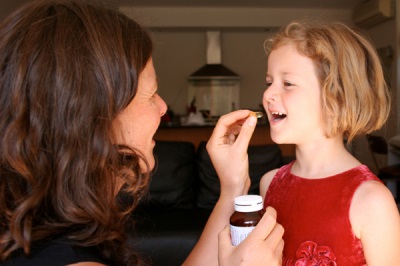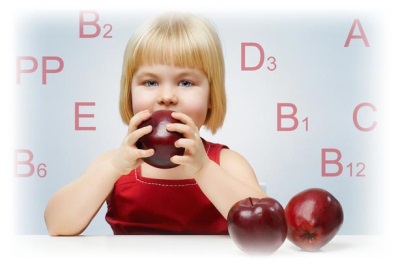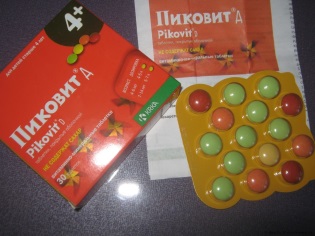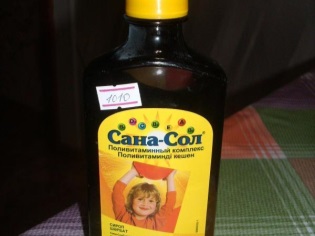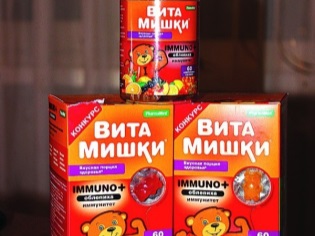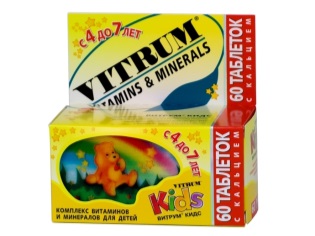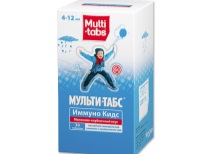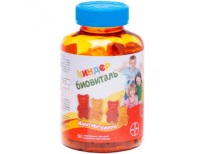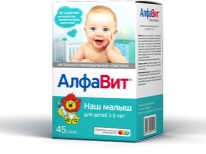Vitamins for children to improve immunity
The work of the immune system is especially important in childhood, so parents should take care to strengthen it. To do this, it is necessary to provide the baby in the first months of life with breast milk, and after the introduction of complementary food, make sure that the baby’s nutrition is balanced. Also, for strong immunity, it is important to observe the daily regimen, monitor hygiene, walk in the fresh air.
What is the effect on the child’s immunity of vitamins that the baby’s body receives from food or vitamin supplements? Do children need vitamin preparations to strengthen their immunity, and which supplements among those presented in pharmacies have the best composition and action?
What is immunodeficiency?
Immunodeficiency is called a weakening of the immunity of the child, the appearance of which you can judge by the following features:
- The child began to catch cold often. As soon as the illness had passed, after a few weeks, the child had a new cold. Viral infections of the respiratory tract appear in a child from 4-6 times a year and more often.
- After the disease, the baby is hard to recover.
- Lymph nodes increased.
- The baby quickly gets tired and feels sleepy, his concentration of attention is reduced.
- The kid complains of bloating and abdominal pain, he has causeless diarrhea.
- The child's nails are stratified and often break, and the hair begins to fall in larger quantities.
- Allergic reactions may occur.
Do all children need vitamins, see the transfer of Dr. Komarovsky.
Will the revision of the diet?
Opponents of vitamins in the form of pharmaceutical preparations insist that it is necessary to fill the lack of these nutrients only from food. For example, vitamin D should be obtained from sea fish, C - from fruit, A - from liver and carrots, and E - from vegetable oils and yolks.
However, to get enough vitamins, you need a fairly large amount of food that not every child will eat. In addition, an excess in the diet of some fruits, fish and other products is fraught with the appearance of allergies. It is much more effective in case of vitamin deficiency to give proven vitamin supplements in which nutrients are presented in the right age dose.
Indications for the use of vitamin complexes
Such drugs are prescribed:
- With inadequate, as well as improperly balanced nutrition of the child.
- With elevated and enhanced neuropsychiatric as well as physical exertion.
- When fatigue of schoolchildren.
- In the period of recovery after acute diseases.
- With seasonal deficiency of vitamins.
- Adolescents due to a period of intensive growth.
About the symptoms of the need to use vitamins, see the video channel "Teledetki" - pediatrician M. Nikolsky tells a lot of interesting things.
Prophylactic use to increase the body's resistance to colds and infections is a big question, since there is no direct relationship between these concepts.
Vitamin preparations are usually recommended to give children in the morning, as many complexes have a tonic effect. It is also important to remember that it is impossible to exceed the recommended dosage.
S.G. Makarova, MD and a nutritionist, says that all children, without exception, have a vitamin deficiency, proven by numerous studies. When choosing vitamin complexes you need to follow certain rules. For more information, see the video channel of the Union of Pediatricians of Russia.
But opinions are divided. With a balanced diet, a child does not have vitamin deficiency - many pediatricians of Russia assert. How to ensure the child the correct diet, see the excerpt from the transfer of Dr. Komarovsky.
Contraindications
Vitamin complexes to increase the protective forces of the child’s body do not provide for:
- Individual intolerance to any ingredient.
- Hypervitaminosis.
How to act on the immune system?
The health of the baby and its resistance to the occurrence of diseases depends on the use of almost all vitamins, but the most important role for increasing the protective forces is played by:
- Vitamin A - helps protect the body from viruses and tumors, improves eyesight, promotes the treatment of allergic reactions, stimulates skin regeneration.
- E - increases the protective forces against viruses, bacteria and cancer cells, affects the development of the entire body of the baby.
- With - helps to resist colds, strengthens blood vessels, gums and teeth.
- D - important for bone tissue, heart function, immunity and blood clotting.
That is why the choice of a drug that will positively affect the immune system, it is important to look closely at the content of these vitamins.
Kinds
Vitamin preparations, the reception of which affects the state of the child’s immune system, are produced in the form of:
- Powder.
- Syrup
- Chewable lozenges or tablets.
- Pill with a shell.
The smallest children (from one year old) are given vitamin preparations in powder, dissolving it in food, as well as in the form of syrup. Older babies are offered chewable tablets with pleasant fruit flavors. Schoolchildren and adolescents can be given pills that are swallowed with water.
In addition to the forms of release, all vitamin preparations differ in composition. Allocate complexes:
- The first generation. It is used with therapeutic or prophylactic vitamin preparations containing only one component, for example, ascorbic acid. They are usually prescribed for symptoms of a shortage of one of the substances.
- The second generation. These are complexes of several vitamins, which can also be supplemented with minerals.
- Third generation. In such preparations, the vitamin-mineral complex is combined with plant extracts, for example, from wild rose.

Reviews: what vitamins are considered good?
Based on numerous reviews of parents, good vitamins that strengthen the immune system, consider:
- Alphabet.
- Pikovit
- Vitrum.
- VitaMishki.
Groups
Vitamins that are needed by the human body are divided into two main groups:
- Water soluble. These include vitamins of group B, C. They are responsible for the functioning of the nervous system, blood formation, metabolic and regenerative reactions in tissues, tissue respiration, vascular wall strength, liver function and many other processes in the body.
- Fat soluble. This group includes vitamins D, A, E and K. They are important for the growth of the skeleton, strengthening of the teeth, bone formation, hair growth, normal blood clotting, vision and absorption of fat.
Age requirements
It is important to note that children should be given only children's vitamins, since their composition is very different from complexes for adults. In addition, preparations for children are divided into groups depending on the age group of children for whom they are intended, since the needs for different vitamins in children, say, 3 years old and 9 years old, will be very different. Consider their features for different age periods.
1 year
Daily need of 1 year old children for vitamins:
|
IN 1 |
0.7 mg |
|
AT 2 |
0.8 mg |
|
B3 (PP) |
9 mg |
|
AT 5 |
3 mg |
|
AT 6 |
1 mg |
|
B7 (N) |
20 mcg |
|
B9 (folate) |
50 mcg |
|
AT 12 |
0.7 µg |
|
BUT |
1350 IU (450 mcg) |
|
D |
400 IU (10 µg) |
|
E |
6 mg |
|
WITH |
40 mg |
|
TO |
15 mcg |
Children of this age most need vitamins B, D, C, PP and A, because they are responsible for the active growth of a baby older than 1 year. Since one-year-old children do not know how to swallow tablets, vitamin preparations are given to them in liquid form (syrup) or mixed with food (powder). It is advisable to avoid vitamin K supplements because they can cause bleeding and impair immunity.
Consider the most common vitamin complexes for this age group:
|
Vitamin preparation |
Dosage per day |
Special features |
|
Peaks 1+ |
10 ml |
Contains a daily dose of vitamins B1, B2, C and PP |
|
Sana-sol |
5 ml |
There are no vitamins H and B12 |
|
Alphabet Our baby |
1 serving (3 powders) |
Ingredients no vitamin H |
|
Kinder Biovital |
5 g |
The composition does not include vitamins H and B9, but is characterized by the presence of lecithin |
|
Multi-tabs baby |
1 tablet |
Contains a daily dose of vitamin D |
2 years
The daily needs of a two-year-old baby are the same as at the age of one. Children over 2 years old still need vitamins B, A, C and D. Vitamin K is still advised to be avoided due to the risk of bleeding and immunity disorders. From two years old, the baby can be given not only syrup, but also chewable tablets.
Vitamin complexes used for the prevention of hypovitaminosis and immunodeficiency for two years old children are:
|
Vitamin preparation |
Dosage per day |
Special features |
|
Peaks 1+ |
10 ml |
Contains a daily dose of vitamins B1, B2, C and PP |
|
Kinder Biovital |
5 g |
The drug does not include vitamins H and B9, but is characterized by the presence of lecithin |
|
Alphabet Our baby |
1 serving (3 powders) |
No vitamin H in the composition |
|
Multi-tabs baby |
1 tablet |
Contains a daily dose of vitamin D |
|
Sana-sol |
5 ml |
There are no vitamins H and B12 |
3 years
A child of 3 years of age needs such vitamins a day:
|
IN 1 |
0.9 mg |
|
AT 2 |
1.1 mg |
|
B3 (PP) |
12 mg |
|
AT 5 |
4 mg |
|
AT 6 |
1.1 mg |
|
B7 (N) |
25 mcg |
|
B9 (folate) |
75 mcg |
|
AT 12 |
1 mcg |
|
BUT |
1600 IU (500 mcg) |
|
D |
400 IU (10 µg) |
|
E |
7 mg |
|
WITH |
45 mg |
|
TO |
20 mcg |
As a rule, it is at the age of three that children begin to go to preschool, they are in contact with other babies. The stress that many children experience when they get used to kindergarten can affect their immune function. That is why thiamine, vitamin A, B6, C and PP, as well as riboflavin, must necessarily be in the complexes for three-year-olds or their diets.
The most optimal complex vitamins for three years are:
|
Vitamin preparation |
Dosage per day |
Special features |
|
Kinder Biovital |
5 g |
The supplement does not include vitamins H and B9, but is distinguished by the presence of lecithin |
|
Multi-tabs baby |
1 tablet |
Contains a daily dose of vitamin D |
|
Alphabet Kindergarten |
1 serving (3 tablets) |
Does not include biotin |
|
Sana-sol |
5 ml |
In addition, there are no vitamins H and B12 |
|
Vitrum Kids |
1 tablet |
Fully covers the needs for B1, B2, PP, B5, B9, B12, A, D, C and E |
|
Pikovit 3+ |
2 tablets |
Contains 100% daily dose of pantothenic acid |
|
Pikovit Prebiotic |
5 ml |
Contains oligofructose and a daily dose of pantothenic acid, but does not include vitamin H |
|
Multi-tabs Immuno Kids |
1 tablet |
100% covers the requirements for B1, B2, B3, B6, B9, B12, D, E, C and K |
|
VitaMishki Immuno + |
1 pastil |
The supplement contains 100% daily intake of vitamin C, but there are no vitamins B, D, A, K |
4 years, 5 years and 6 years
Vitamin requirements for children 4-6 years old are the same as in three years. At the age of 4, a particularly active growth of muscles and the skeletal system begins, therefore among vitamins it is especially important to get enough vitamins C, groups B, D and A.
Among the best complexes for children of this age that can enhance immunity are called:
|
Vitamin preparation |
Dosage per day |
Special features |
|
Vitrum Kids |
1 tablet |
Fully provides with vitamins B1, B2, PP, B5, B9, B12, A, D, C and E |
|
Kinder Biovital |
5 g |
The supplement does not include vitamins H and B9, but is distinguished by the presence of lecithin |
|
Sana-sol |
10 ml |
In addition, there are no vitamins H and B12 |
|
Multi-tabs Immuno Kids |
1 tablet |
100% covers the requirements for B1, B2, B3, B6, B9, B12, D, E, C and K |
|
VitaMishki Immuno + |
1 pastil |
The product contains a 100% daily rate of vitamin C, but it does not contain vitamins B, D, A, K |
|
Pikovit 4+ |
4-5 tablets |
Does not include vitamin E |
|
Pikovit Prebiotic |
5 ml |
Does not contain biotin, but includes oligofructose and a daily dose of pantothenic acid |
|
Alphabet Kindergarten |
1 serving (3 tablets) |
Biotin free |
7, 8, 9 and 10 years
Daily need of a child's body for vitamins at the age of 7-10 years:
|
IN 1 |
1 mg |
|
AT 2 |
1.2 mg |
|
B3 (PP) |
12 mg |
|
AT 5 |
5 mg |
|
AT 6 |
1.4 mg |
|
B7 (N) |
30 mcg |
|
B9 (folate) |
100 mcg |
|
AT 12 |
1.4 mcg |
|
BUT |
2300 IU (700 mcg) |
|
D |
400 IU (10 µg) |
|
E |
7 mg |
|
WITH |
45 mg |
|
TO |
30 mcg |
At this age, the growth of the infant's bone and muscular system slows down, while the brain structures begin to form more actively. In order for children of 7–10 years of age to tolerate intellectual load and withstand catarrhal diseases, it is important for them to get enough vitamins E, C, B and A.

The following drugs will be the best choice for this age group:
|
Vitamin preparation |
Dosage per day |
Special features |
|
Pikovit 7+ |
1 tablet |
Enhanced content of B vitamins |
|
Pikovit Prebiotic |
5 ml |
Does not contain biotin, but includes oligofructose and a daily dose of pantothenic acid |
|
Alphabet Schoolboy |
1 serving (3 tablets) |
Folic acid and vitamin E are contained in 100% of the daily requirement, but vitamin H is missing. |
|
Kinder Biovital |
10 g |
The supplement does not include vitamins H and B9, but contains lecithin |
|
VitaMishki Immuno + |
2 lozenges |
The product contains a 100% daily rate of vitamin C, but it does not contain vitamins B, D, A, K |
|
Multi-tabs Immuno Kids |
1 tablet |
Fully covers daily needs for B1, B2, PP, B9, B12, C, K, D and E |
11 years
At this age, the body needs of children in vitamins increase and compare with adults, but at the same time they differ depending on the sex of the child.
|
The boys |
Girls |
|
|
IN 1 |
1.5 mg |
1.1 mg |
|
AT 2 |
1.8 mg |
1.3 mg |
|
B3 (PP) |
17 mg |
15 mg |
|
AT 5 |
4-7 mg |
4-7 mg |
|
AT 6 |
2 mg |
1.6 mg |
|
B7 (N) |
17 mcg |
15 mcg |
|
B9 (folate) |
200 mcg |
200 mcg |
|
AT 12 |
2 mcg |
2 mcg |
|
BUT |
3000 IU |
3000 IU |
|
D |
400 IU (10 µg) |
400 IU (10 µg) |
|
E |
10 mg |
8 mg |
|
WITH |
60 mg |
60 mg |
|
TO |
45 mcg |
45 mcg |
It is important to ensure that the growing child does not experience a lack of such vitamins, as this will slow down his physical development. Hypovitaminosis will also affect the functioning of the brain and the immune system.
The best choice for children over 11 years old will be such complexes:
|
Vitamin preparation |
Dosage per day |
Special features |
|
Pikovit 7+ |
1 tablet |
Enhanced content of B vitamins |
|
Alphabet Schoolboy |
1 serving (3 tablets) |
Does not include biotin |
|
VitaMishki Immuno + |
2 lozenges |
In addition there are no vitamins of group B, D, A, K, but the daily dose of vitamin C is presented |
|
Kinder Biovital |
10 g |
The product does not include folic acid and vitamin H, but contains lecithin |
Which is better to choose: a comparison of different brands of vitamins
Criteria for selecting a suitable vitamin complex for immunity strengthening are the age of the child and the composition of the drug. Next you need to decide on the form of release and assess the reliability of the manufacturer. We compared the main characteristics of vitamins for children in the table:
|
A drug |
From what age can be given |
Composition |
Release form |
Features of the complex and its application |
|
Pikovit |
From 1 year (tablets - from 4 years) |
9 vitamins |
Syrup Chewable tablets Pills |
The drug is presented in different dosages and dosage forms, depending on the age of the child. |
|
Pikovit Prebiotic |
From 3 years old |
10 vitamins Oligofructose |
Syrup |
The drug is given from a spoon, can be mixed with juice, fruit puree or tea. |
|
Sana-sol |
From 1 year |
10 vitamins |
Syrup |
The supplement contains sorbitol, so it can cause violations of the gastrointestinal tract. |
|
VitaMishki Immuno + |
From 3 years old |
Vitamin E Vitamin C Selenium and Zinc Sea buckthorn extract |
Chewable lozenges |
Jelly bears figurines that have a lemon, orange, grape and peach flavor. |
|
Vitrum Kids |
4 years old |
12 vitamins 10 minerals |
Pills |
Chewing figurines of animals that should be chewed after eating. |
|
Multi-tabs Immuno Kids |
From 3 years old |
13 vitamins 6 minerals Lactobacillus |
Pills |
Should be taken during a meal or immediately after it. Recommended up to 12 years old. |
|
Kinder Biovital |
From 1 year |
10 vitamins 3 minerals Lecithin |
Gel |
The drug has a viscous consistency, fruit aroma and sweet-sour taste. |
|
Alphabet Our Baby |
From 1.5 years |
11 vitamins 5 minerals |
Powder |
Daily, the child is given 3 different powders after the main meals, dissolved in boiled warm water. |
|
Alphabet Kindergarten |
From 3 years old |
13 vitamins 9 minerals |
Chewable tablets |
Recommended for children who attend kindergarten. Consists of hypoallergenic components, collected in several tablets. |
|
Alphabet Schoolboy |
From 7 years old |
13 vitamins 10 minerals |
Pills |
Every day, the child is given pills of different colors — red to support the work of the nervous and circulatory systems, green — for the immune and endocrine systems, and yellow — for brain activity and bone formation. |
Analogs Immunostimulants
In addition to vitamin complexes, additives that contain a positive effect on immunity, which contain:
- Echinacea. This plant has an immunostimulating effect, but it can only be given to children after consulting a doctor.
- Zinc. With the right dosage, this mineral harmlessly and effectively strengthens the immune system. Children up to 6 years of age are recommended dosage of 10-20 mg, and students - 20-40 mg per day. Zinc can also be obtained from products - meat, bread, cheese, cereals, milk.
- Omega-3 fats. In modern children, there is often a shortage of such fatty acids in the diet, which may be associated with early weaning and low fish consumption. You can fill the deficit by taking fish oil in the form of liquid preparations, chewable tablets or capsules.
- Probiotics. So called preparations of bacteria belonging to the normal microbial flora of the intestine - bifidobacteria and lactobacilli. You can give them from 6 months of age, adding a powder form to food for babies. Grown children can be given probiotics in capsules or tablets. In order for the bacteria to actively develop in the intestines, prebiotics should also be added to the diet of the crumbs. To do this, give your baby enough vegetables and whole grain products.
In what cases are medications needed?
If your baby has serious ailments, indicating a decrease in immunity, you should not buy the vitamin complex and delay the visit to the doctor. Turning to the immunologist, you will be able to recognize in time the immune deficiency, which can not be cured with vitamin supplements. In such cases, the doctor will prescribe medication-immunostimulants (for example, Immunal or Ribomunil), selecting the desired dose, as well as determining the duration of therapy.
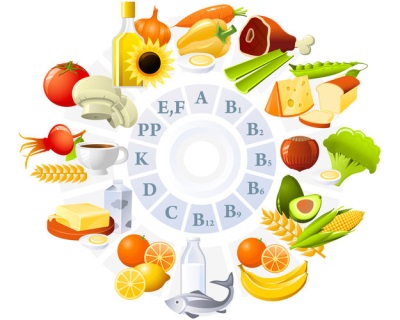
How to improve the immunity of your child is described in the video of the Union of Pediatricians of Russia.





